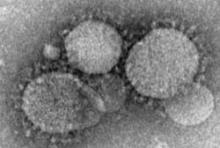Although currently considered an “endemic, low-level public health threat,” Middle East respiratory syndrome coronavirus (MERS-CoV) has the potential to mutate to have an increased capacity for human transmission, making preventive measures among health care workers crucial, reported Dr. Alimuddin Zumla and his colleagues from University College London, England.
As no drug treatment exists for the disease, which can range from mild to severe with acute respiratory distress syndrome and organ failure leading to death, clinicians are strongly urged to put several preventive measures in place to avoid its spread in health care facilities, the authors said. Recommended measures include droplet precautions such as wearing a surgical mask, using eye protection, and taking contact and respiratory precautions, Dr. Zumla and his colleagues said in the report.
MERS cases reported to the World Health Organization as of May 31, 2015, total 1,149, including 431 deaths, according to a Lancet press release.
The disease is believed to be spread through direct or indirect contact with dromedary camels, and most cases have been concentrated in Saudi Arabia, with added cases reported in Europe, the United States, and Asia in individuals who traveled from the Middle East, or their contacts, the authors said. The exact mechanism of transmission remains unknown.
“Although interhuman transmission is still inefficient, health authorities, governments, and the research community should be prepared for the emergence of a MERS-CoV with increased capacity for transmission and pandemic potential,” they said.
Read the full article here.

